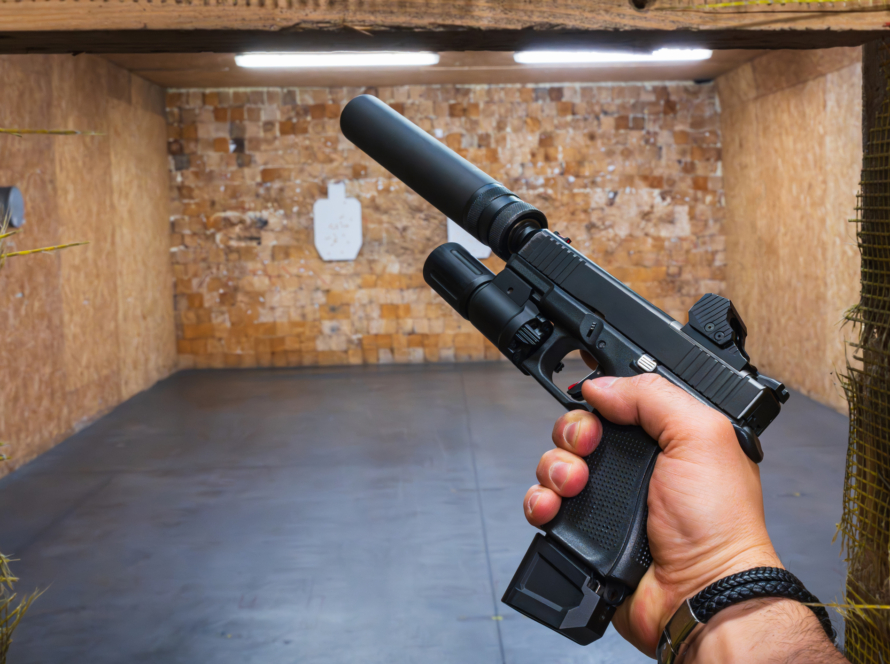Picking the right suppressor isn’t about the flashiest brand or the lowest price — it’s about fit: fit to your firearm, fit to your ammo, and fit to your mission. Whether you’re shopping for a dedicated pistol can, a versatile rifle can, or a platform-specific solution, understanding the core features will let you buy confidently and legally. This guide focuses on the practical attributes to prioritize so your suppressor performs where it matters.
Platform & Caliber Compatibility (First Rule)
The single most important criterion is ensuring the suppressor is rated for the firearm’s caliber and intended ammunition. Manufacturers list rated calibers and pressure limits — follow them. If you plan to shoot multiple calibers, choose a can rated for the highest-pressure round you’ll use (or consider caliber-specific cans). Never use a suppressor outside its rated specifications.
Why it matters: Safety, durability, and avoiding baffle strikes or catastrophic failures.
Mounting System & Alignment (Repeatability Wins)
A secure, repeatable mounting system reduces the chance of alignment issues that cause baffle strikes and accuracy problems. Look for designs with proven thread mounts, quick-attach systems, or adapter options that maintain concentricity. Confirm whether the mount returns to zero (important for precision shooters) and whether it requires re-indexing after removal.
Why it matters: Accuracy, safety, and convenience.
Size, Weight & Handling Trade-offs
Larger suppressors generally offer better sound reduction but add length and weight to your firearm. For pistols or short-barreled rifles you may prioritize compactness and weight; for long-range precision rifles you may accept a longer can for improved sound suppression. Think about how the added length affects balance, holstering, and maneuverability.
Why it matters: Ergonomics and mission suitability.
Noise Reduction Performance (Context is Key)
Published decibel numbers are useful but must be compared carefully — different manufacturers test using different barrels, distances, and ammo. Ask for like-for-like test conditions, or rely on independent third-party tests and user feedback. Remember: suppressors reduce muzzle blast; supersonic bullet crack is a separate noise factor.
Why it matters: Real expectations versus marketing claims.
Serviceability & Warranty (Long-Term Value)
Some suppressors are user-serviceable or modular; others are sealed and maintenance-free. Prioritize manufacturers that offer clear service programs, rebuilds, parts, and generous warranties. A reliable warranty and a documented service process protect your investment and simplify long-term ownership.
Why it matters: Longevity, cost of ownership, and peace of mind.
Material & Durability (High-Level Considerations)
Manufacturers use different materials and heat treatments for core components. While you don’t need metallurgical detail to buy wisely, favor brands with proven track records and transparent manufacturing standards. If you shoot hard (high round count, mag dumps), durability and heat-management features become more important.
Why it matters: Reliability under sustained use.
Backpressure & Cycling (Platform-Specific)
Some suppressor designs increase backpressure, which can affect gas systems and cycling reliability in semi-automatic firearms. If you run gas-operated pistols or rifles, consider whether the suppressor design is known to work with your platform or whether gas system adjustments (tune/adjust) might be recommended by the manufacturer or a qualified gunsmith.
Why it matters: Reliable function and reduced parts wear.
Aesthetics, Finish & Mounting Compatibility
Finish options (e.g., Cerakote, nitriding) and external diameter can be important for corrosion resistance and matching your firearm’s look. Also ensure your suppressor’s mounting interface matches common muzzle devices or that adapters are available.
Why it matters: Practical protection and integration with your build.
Price vs Support (Don’t Buy Cheap, Buy Smart)
A low-priced suppressor may be tempting, but after-sale support, warranty, and serviceability are where value shows over time. Consider total cost of ownership: taxes (where applicable), shipping, service, rebuilds, and accessories like mounts and crush washers.
Why it matters: Avoiding surprise costs and getting long-term reliability.
Community & Independent Reviews
Look for third-party tests, user experiences, and range reports — not just vendor spec sheets. Trusted reviews will highlight platform-specific quirks, real-world decibel results, and long-term durability signals.
Why it matters: Real-world evidence beats polished marketing.
Conclusion
Choosing the right suppressor is an exercise in matching priorities: what you shoot, how you shoot, and where you’ll use it. Prioritize compatibility, mounting repeatability, and manufacturer support over trend-driven hype. When in doubt, consult a licensed dealer or manufacturer rep — and always follow NFA and state rules for acquisition and use.
Downrange Precision Arms can help you evaluate options based on your platform and mission. Tell us your firearm and primary use (range, hunting, home defense, competition) and we’ll recommend the top features to prioritize.





